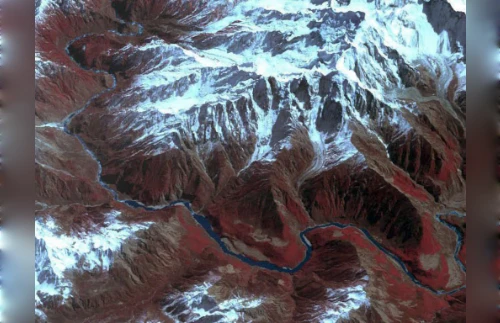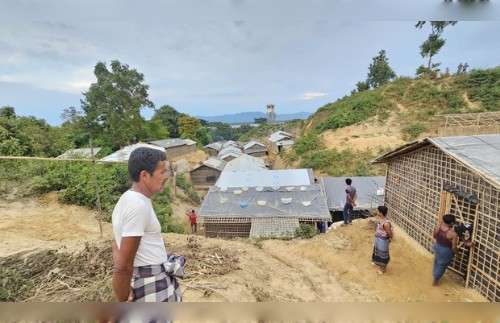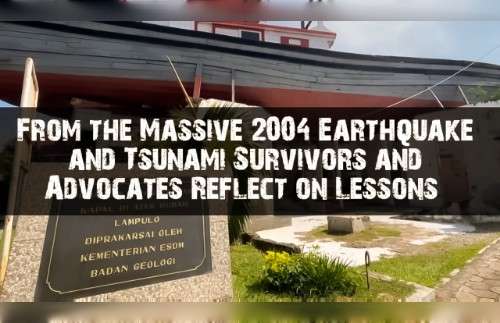Arie Firdaus and Tria Dianti

Separatist rebels in Indonesia’s Papua said Tuesday that a foreign pilot taken hostage last week was alive and well, as they released undated photographs and videos they said showed the New Zealand citizen, amid a group of apparent insurgents, in what appeared to be a forested area.
Security forces said they were looking for the pilot Philip Mehrtens in the highlands area in and around Nduga regency, a hotspot for insurgents because it provided good cover, where the rebels set fire to his plane on Feb. 7.
BenarNews could not immediately reach Susi Air to verify if the person seen in the video received late Tuesday from the West Papua National Liberation Army (TPNPB) was Mehrtens.
“TPNPB-OPM National Command officially releases photos and videos with New Zealand pilot, and the pilot from New Zealand is well and healthy,” Sebby Sambom, spokesman for the Liberation Army, said in a statement.
A man the Liberation Army said is Mehrtens is seen speaking in one of the videos.
“The Papuan military has taken me captive in their fight for Papuan independence. They ask for the Indonesian military to go home, if not I will remain captive and my life is threatened,” the man said.
He is standing next to Egianus Kogoya, the local Liberation Army commander, and other rebels, Sambom said.
The man identified as Kogoya is seen saying the hostage would be killed if they are attacked by Indonesian security forces.
“If they come to us, we will shoot the pilot,” he warned.
“We are holding the pilot so that all countries open their eyes for a free Papua,” he said.
Another video showed when rebels set fire to the Pilatus C-6 Porter aircraft belonging to Susi Air.
Sambom said Mehrtens was being used as leverage.
“Because this is a political issue, the New Zealand pilot is a guarantee in political negotiations,” Sambom said in the statement.
BenarNews could not independently verify when and where the videos were taken.
On Tuesday, Mohammad Mahfud MD, the coordinating minister for political, legal and security affairs, said the government would prioritize “persuasive efforts” to free the pilot.
“Taking a civilian hostage for any reason is unacceptable. Therefore persuasive efforts are the main guideline for the safety of the hostage, but the government is not ruling out other options,” Mahfud told a news conference.
Mahfud added that Jakarta was communicating with the New Zealand government to discuss efforts to accelerate Mehrtens’ rescue.
Commenting on the rebels’ demand, Mahfud said: “Papua is a legal part of the Unitary State of the Republic of Indonesia both according to the Constitution of the Republic of Indonesia and according to international law.”
In a statement to BenarNews earlier Tuesday, the pilot’s employer, Susi Air, said it had not stopped flying to remote parts of the Papua region despite the attack on its aircraft and the hostage-taking.
“We will not stop flying in the Papua region and we will continue to fly elsewhere, but please give us protection,” said the airline’s chief of operations, Melinasary, who goes by a single name.
“We have supported flights for the search process and provided logistical assistance in the form of food in the search for our pilot.”
Jungle-covered Papua relies on air transportation in the absence of extensive road networks.
Donal Fariz, a lawyer for Susi Air, said the rebel group had not contacted the airline to communicate demands.
“They never contacted us directly to convey what they wanted. We leave it to the authorities, hopefully they can help release the pilot,” Donal told BenarNews.
Paro residents flee
Meanwhile, Papua military command spokesman Col. Herman Taryaman said 167 people had fled Paro district in Nduga regency in fear of violence after the hostage-taking incident.
They were being sheltered in the residence of a local official.
Some of the villagers walked for five days to neighboring Kenyam district, the main town in Nduga, said Herman.
“They fled because they were afraid of intimidation from the armed criminal and terrorist group,” Herman told BenarNews, referring to the separatists.
Emanuel Gobay, an activist at the Papua Legal Aid Institute (LBH), said the latest developments could force more people to leave Nduga after a surge in clashes between rebels and government security forces in 1998 forced villagers from their homes.
“Displaced people from 2018-2019 have not returned. We fear there will be more pockets of displaced people,” he told BenarNews.
Violence and tensions in Papua, a region that makes up the western half of New Guinea island, have intensified in recent years.
In July 2022, rebels killed 10 civilians, mostly traders from other parts of Indonesia, accusing them of being spies for government security forces.
It was the deadliest attack in the region since 2018 when insurgents attacked workers who were building roads and bridges in Nduga, killing 20 people, including an Indonesian soldier.
At the time, the TPNPB said those killed were not civilian workers, but soldiers from the army’s engineering detachment.
That attack prompted the government to send more troops to Papua.
The region has a history of human rights violations by Indonesian security forces and police. Papuan separatist rebels also have been accused of attacking civilians.
In 1963, Indonesian forces invaded Papua, a former Dutch colony like Indonesia, and annexed it. In 1969, the United Nations sponsored a referendum where only about 1,000 people voted.
Despite accusations that the vote was a farce, the U.N. recognized the outcome, effectively endorsing Indonesia’s control over Papua.
Copyright ©2015-2022, BenarNews. Used with the permission of BenarNews.https://www.benarnews.org/












